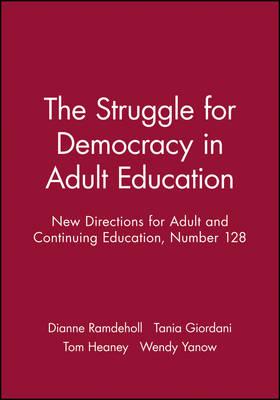Overview
Adult education in the United States has its roots in democracy. The editors and contributors of this volume build on that historical relationship and examine an adult education practice that not only shapes minds, but also seeks to build communities of collaborative action. We explore best practices shared in and informed decision making within different contexts of adult education--in the community, the classroom, and the university--by focusing on various aspects of our work as adult education practitioners. Early in the twentieth century, adult education was often described as a ""movement,"" a spontaneous emergence of study circles, town hall meetings, and learning groups, all engaged in better understanding their world to build a better one democractically. Education in its broadest sense--learning to name the world--was at the center of that movement. At the same time, and at the opposite end of the spectrum, were those who made the leap from lifelong learning to lifelong schooling. Collapse of the almost-movement was inevitable. Educators in the workplace and in formal institutions of learning sought to shape minds, rather than free them. Consequently, adult education grew up alongside a practice that devalued learning for democratic action and stressed adaptation to the workplace, corporate America, and a consumer economy. Perhaps nostalgia is a lingering desire to return to a past that never was, but many adult educators, including the authors represented in this volume, have been attempting to reclaim their birthright--a critical but steadfast commitment to building democracy. This is the 128th volume of the Jossey-Bass higher education quarterly report series New Directions for Adult and Continuing Education. Noted for its depth of coverage, New Directions for Adult and Continuing Education is an indispensable series that explores issues of common interest to instructors, administrators, counselors, and policymakers in a broad range of adult and continuing education settings, such as colleges and universities, extension programs, businesses, libraries, and museums.
Full Product Details
Author: Dianne Ramdeholl (Empire State College) ,
Tania Giordani (College of Lake County) ,
Tom Heaney (National-Louis University, Chicago) ,
Wendy Yanow (National-Louis University, Chicago)
Publisher: John Wiley & Sons Inc
Imprint: Jossey-Bass Inc.,U.S.
Volume: 128
Dimensions:
Width: 15.00cm
, Height: 0.60cm
, Length: 22.90cm
Weight: 0.163kg
ISBN: 9781118003022
ISBN 10: 1118003020
Pages: 112
Publication Date: 04 February 2011
Audience:
Professional and scholarly
,
Professional & Vocational
Format: Paperback
Publisher's Status: Out of Print
Availability: In Print

Limited stock is available. It will be ordered for you and shipped pending supplier's limited stock.
Author Information
Dianne Ramdeholl is an assistant professor in educational studies at the Harry Van Arsdale Center for Labor Studies, Empire State College, New York. Tania Giordani is a professor of adult education at the College of Lake County, Grayslake, IL. Thomas Heaney is an associate professor and director of the Adult Education Doctoral Program at National-Louis University, Chicago. Wendy B. Yanow is adjunct faculty at DePaul University, School for New Learning, Chicago and National-Louis University, College of Arts and Sciences, Chicago, and a consultant in adult education.




